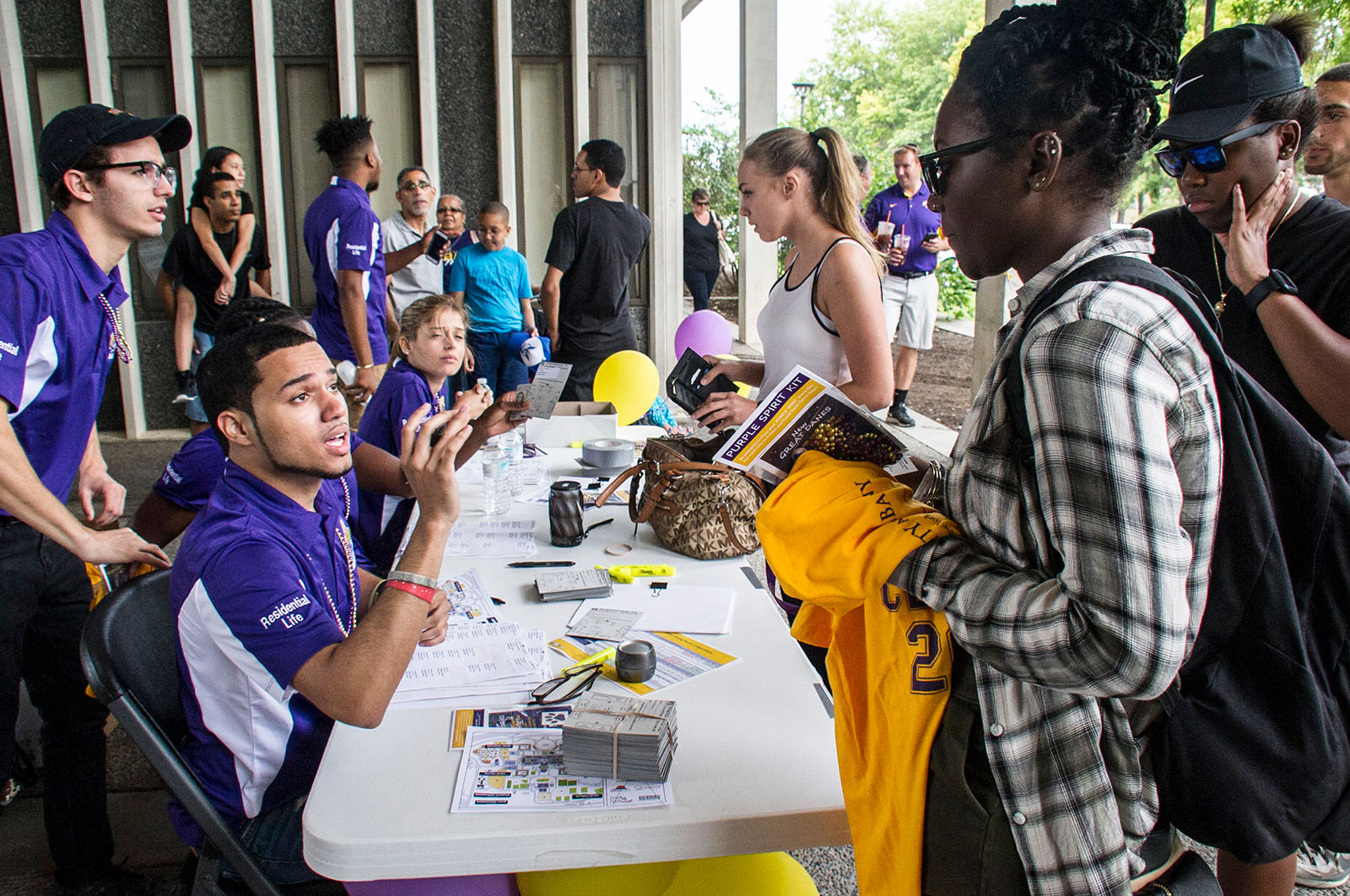
Bachelor of Science
in
Electrical and Computer Engineering
Program Highlights
Faculty: Learn from world-class faculty who are actively engaged in cutting-edge research
Hands-On: Practice what you learn using state of the art equipment and through hands-on laboratories and projects
Design: Solve real-world problems through a year-long capstone design experience with engineering projects sponsored by companies and community organizations
Community: Live and take classes with other incoming freshmen engineering students in the Living-Learning Community
Experience: Access internship and job opportunities near campus at government agencies and companies like General Electric, IBM, Global Foundries
Network: Develop your professional network by joining student chapters of professional organizations including the Institute of Electrical and Electronics Engineers, the National Society of Black Engineers, and the Association for Computing Machinery
You can save time and money by beginning your graduate degree coursework while still enrolled as an undergraduate student. Up to 6 academic credits, billed at the undergraduate rate, will count towards both degrees – so you’ll complete your combined program in only 5 years and spend less than you would if you completed each program separately.
Combine your undergraduate degree with the MS in Electrical and Computer Engineering. This master’s degree provides a high level of specialization in one of three technical concentration areas: signal processing and communications, electronic circuits and systems, and control and computing systems.
UAlbany's program of study encourages you to pursue a focus you are passionate about, giving you greater access to post-graduation opportunities that suit your skill set. With a sound understanding of both electrical and computer engineering, you will be qualified to pursue careers that work with multiple aspects of engineering.
Electrical engineers and computer engineers are in high demand and professionals with these unique skills typically enjoy high starting salaries compared with other majors. The median salary for computer hardware engineers in the U.S. is $115,120 and $97,970 for electrical and electronics engineers, according to the Bureau of Labor Statistics.
Common positions for professionals with this degree include:
- Computer engineer
- Software engineer
- Electrical engineer
- Computer network architect
- Computer hardware engineer
Students in the Electrical and Computer Engineering program have interned and started careers with the following companies:
- Amazon Web Services
- Morgan Stanley
- Naval Nuclear Laboratory
- IBM
- General Electric
- Ernst & Young
- Richmore Aviation
- Leonardo DRS
- Panacea Technologies, Inc.
- ORBCOMM
- AMRI
- General Dynamics
- Automate
- Global Foundries
- NYS Office of Information Technology Services
"While ECE is by no means an easy major, the professors are some of the best people I've met and are always willing to help the students. Being such a small department, we've developed a community where it isn't uncommon to find people sitting around the ECE department helping each other with homework or talking to professors. It's really an amazing department to be a part of."
- Orsi Beke, Class of 2020
Institutional Accreditation
UAlbany is fully accredited by Middle States Commission on Higher Education.
Academic Program Accreditation
The BS Electrical and Computer Engineering program is accredited by the ABET Engineering Accreditation Commission.
Bachelor of Science in Electrical and Computer Engineering:
Program Education Objectives
Graduates of the Electrical and Computer Engineering program are expected to:
- Succeed professionally, whether employed as an engineer, pursuing an advanced degree, or following another career path of their choosing.
- Continue to learn and grow, both personally and professionally; and
- Practice ethical behavior and social responsibility, striving to apply science in service to society.
Student Outcomes
The Student Outcomes for the Electrical and Computer Engineering program are:
- An ability to identify, formulate, and solve complex engineering problems by applying principles of engineering, science, and mathematics.
- An ability to apply engineering design to produce solutions that meet specified needs with consideration of public health, safety, and welfare, as well as global, cultural, social, environmental, and economic factors.
- An ability to communicate effectively with a range of audiences.
- An ability to recognize ethical and professional responsibilities in engineering situations and make informed judgments, which must consider the impact of engineering solutions in global, economic, environmental, and societal contexts.
- An ability to function effectively on a team whose members together provide leadership, create a collaborative and inclusive environment, establish goals, plan tasks, and meet objectives.
- An ability to develop and conduct appropriate experimentation, analyze and interpret data, and use engineering judgment to draw conclusions.
- An ability to acquire and apply new knowledge as needed, using appropriate learning.
Note: The formatting and language as related to “learning objectives and outcomes” for the College of Nanotechnology, Science, and Engineering are ABET specific and differ from our internal UAlbany academic assessment standards.
Enrollment and Graduation Data
What Makes The University at Albany Great

Live and take classes with other incoming freshmen who share your personal interests, passions or intended academic major.

Become a global citizen: international experience is crucial to success in business, education, research, and public policy.

Research, scholarship, and creative activities at the University at Albany is an option for all students, across all academic disciplines. You will be able to learn more about a specific academic field or career path all while building a long-lasting mentoring relationship with a faculty member or principal investigator.
Explore Minors
Build competency in a passion or strengthen your resume.
A minor consists of 18–24 graduation credits which must include a minimum of 9 graduation credits of advanced coursework at or above the 300 level. Most undergraduate degrees require completing a minor and it has to have a different title from your major.
- Acting
- Africana Studies
- Anthropology
- Art
- Art History
- Atmospheric Science
- Bioethics
- Biology
- Broadcast Meteorology
- Business
- Chemistry
- Chinese Studies
- Cognitive Science
- Communication (Fully Online Option)
- Computer Science
- Creative Writing
- Criminal Justice Studies (Fully Online Option)
- Cybersecurity (Fully Online Option)
- Documentary Studies
- East Asian Studies
- Economics
- Educational Studies
- Electrical and Computer Engineering
- Electronics
- Film Studies
- Emergency Preparedness, Homeland Security and Cybersecurity (Fully Online Option)
- English
- Forensic Science
- French
- Game Design and Development
- Geographic Information Science
- Geography
- Globalization Studies
- Hebrew
- History (Fully Online Option)
- Informatics (Fully Online Option)
- Instrumental Performance
- International Studies
- Italian
- Japanese Studies
- Journalism (Fully Online Option)
- Judaic Studies
- Korean Studies
- Latin American and Caribbean Studies
- Law and Philosophy
- Leadership
- Legal Studies
- LGBTQ Studies
- Library and Information Science
- Linguistics
- Machine Learning
- Mathematics
- Medical Anthropology
- Music
- Musical Performance
- Musical Theatre
- Philosophy
- Physics
- Political Science
- Portuguese
- Pre-Education
- Psychology (Fully Online Option)
- Public Health
- Public Policy
- Religious Studies
- Russian
- Russian and Eastern European Studies
- Social Welfare Studies
- Sociology (Fully Online Option)
- Spanish
- Statistics
- Sustainability
- Theatre
- Theatrical Design/Technology
- Urban Studies and Planning
- U.S. Latino Studies
- Vocal Performance
- Women's, Gender and Sexuality Studies





